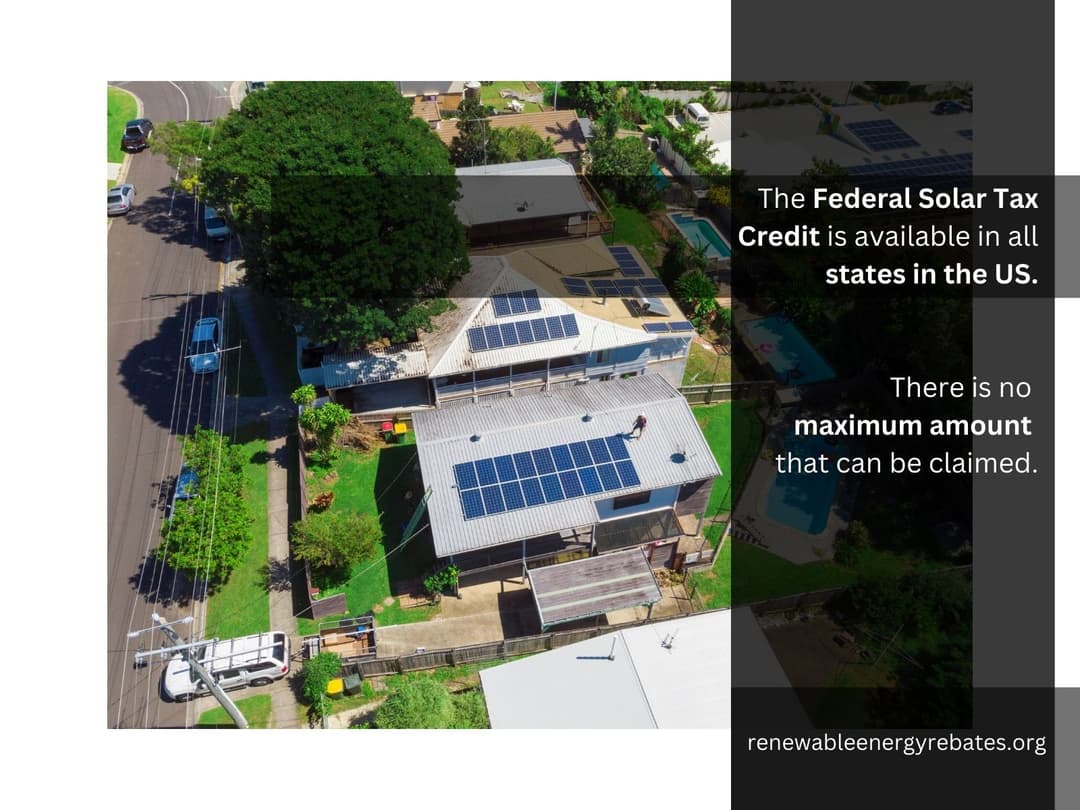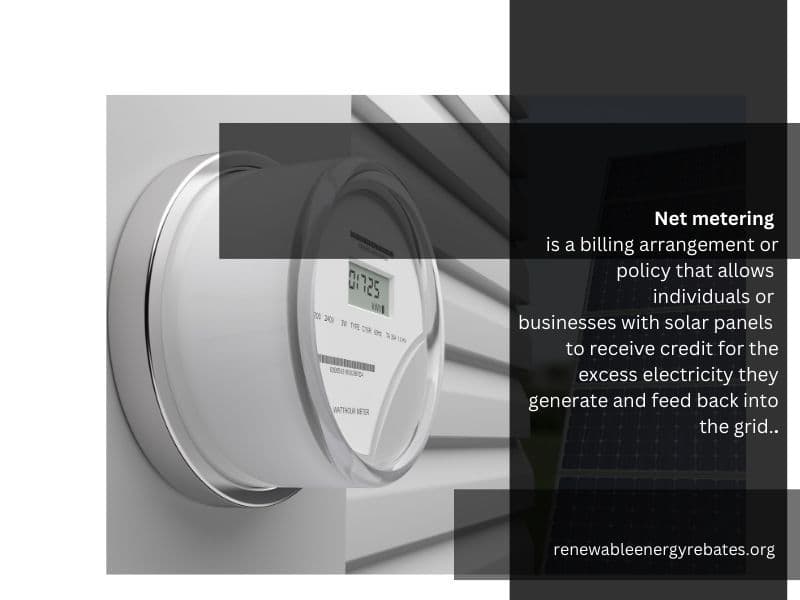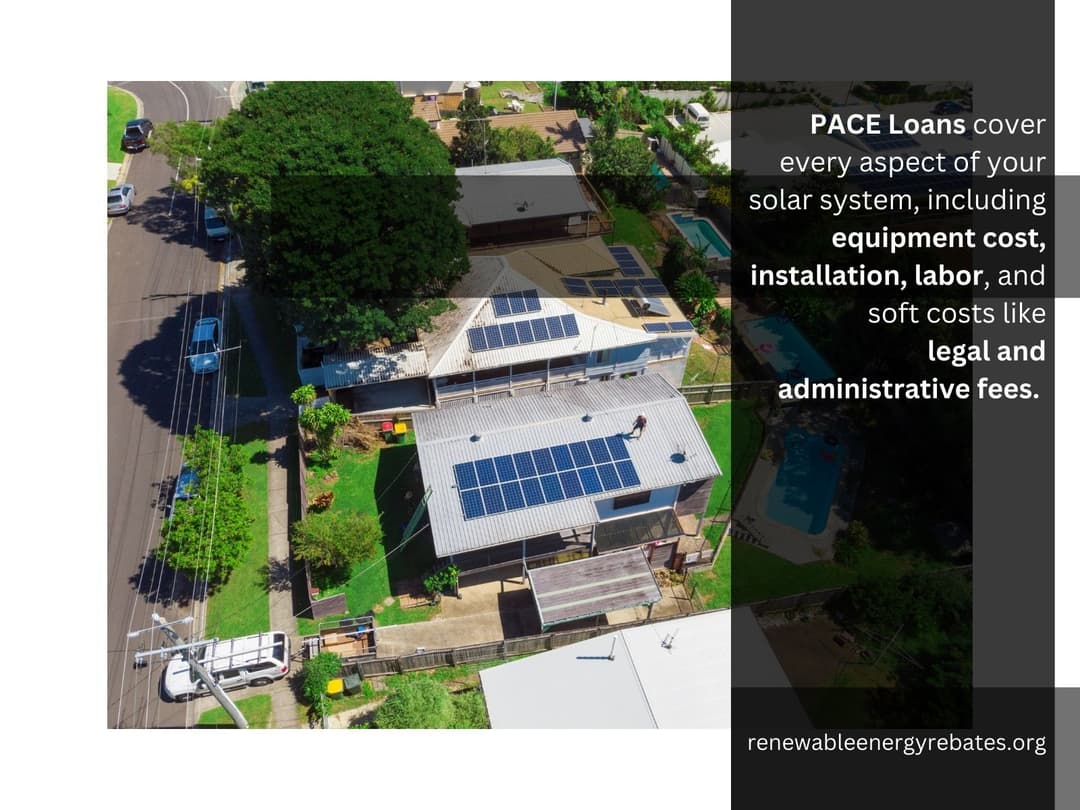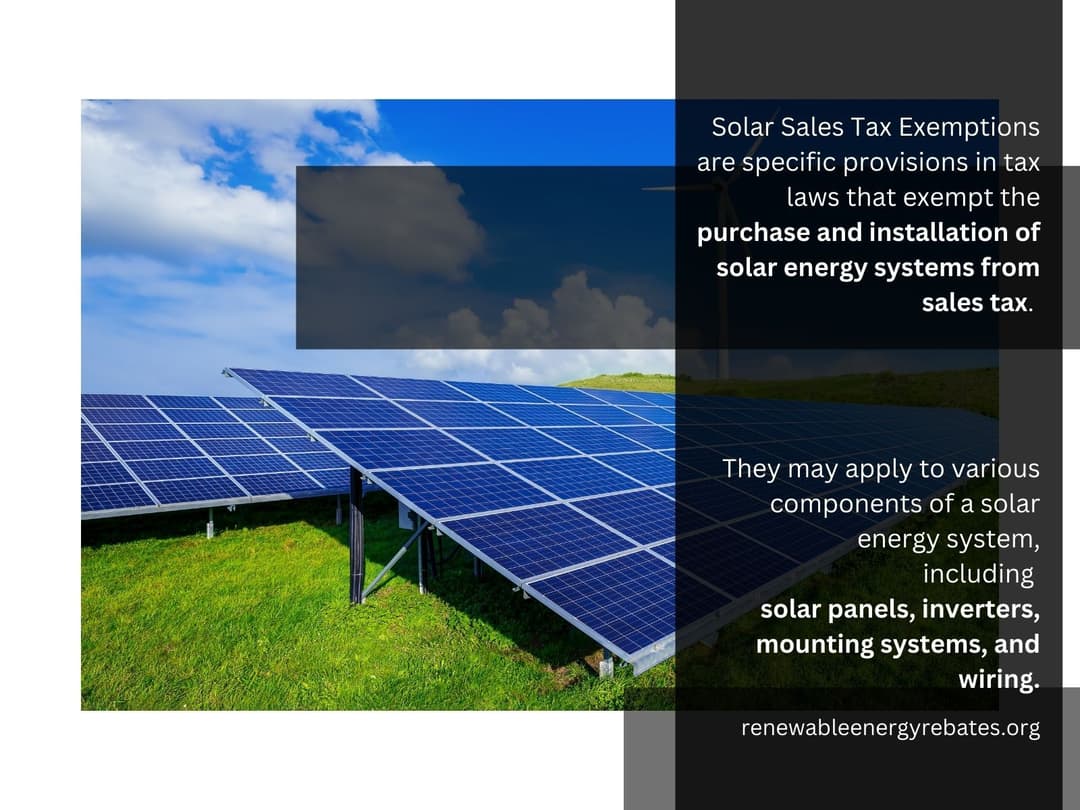Massachusetts Solar Rebates and Incentives
How Much Can You Save on Solar in Massachusetts?
Key Details
- Bay Staters who install solar panels are eligible for a federal tax credit valued at up to 30% of the installation cost.
- Net metering credits can be applied to future utility costs.
- In Massachusetts, local property taxes are waived on solar systems used to meet energy requirements.
- Several utilities offer access to technical help and rebates ranging from $25,000 per customer annually to 50% off specific projects, up to a certain maximum.

Massachusetts Energy Profile
Massachusetts receives 3,944 KJ/m2 of sunlight annually. This amounts to 68.53% of the sunlight compared to other U.S. states. As of 2023, Massachusetts had an installed solar capacity of 4,037 Megawatts (MW), enough solar power to provide electricity to approximately 700,000 homes.
Massachusetts generates 19.4% of its total energy from solar energy.
Massachusetts Solar Tax Credit and Incentives at a Glance
| Massachusetts Solar Incentives | State or Federal | Program Overview |
| Federal Solar Tax Credit (ITC) | Federal | Taxpayers in Massachusetts who install solar panels are eligible for tax credit valued at up to 30% the installation cost. |
| Net Metering | Local | In Massachusetts, net metering credits you for any excess energy your solar panels produce. The credits can be applied to future utility costs.
Note: Municipal utilities are not required to offer net metering, but may do so if they choose. |
| Massachusetts Property Tax Exemption | State | Local property taxes are waived in Massachusetts for twenty years on solar systems used to heat or otherwise meet the energy requirements of taxable property. |
| Chicopee Electric Light - Commercial Energy Efficiency Rebate | Local (Utility) | The Chicopee Electric Light Department (CELD) provides access to technical help, incentives, and low-interest financing through this initiative.
In most cases, $25,000 is the annual limit rebate per customer. |
| Concord Municipal Light Plant - Commercial Energy Efficiency Rebate Program | Concord Municipal Light Plant (CMLP) provides commercial customers with rebates for a number of energy-saving measures.
These include heat pumps, lighting retrofits, solar panels, new construction, and HVAC equipment. |
|
| Holyoke Gas & Electric Residential Energy Conservation Loan Program | Local (Utility) | Holyoke Gas & Electric's (HG&E) Residential Energy Conservation Program offers interest-free loans to qualified homeowners.
A maximum of $5,000 is available for single-family houses, and a total of $10,000 is available for owner-occupied multi-family homes with four or fewer units (at a rate of $5,000 per unit). |
| Hudson Power & Light Photovoltaic Incentive Program | Local | Hudson Light provides eligible customers with a rebate per watt of installed capacity up to 25 kilowatts. |
| Reading Municipal Light Department Rebate | Local (Utility) | The Reading Municipal Light Department (RMLD) provides qualified residential and small commercial customers with energy efficiency incentives. This rebate must not exceed 50% of the project's cost excluding tax, up to a maximum of $24,000. |
| Taunton Municipal Lighting Plant Residential Rebate Program | The Taunton Municipal Lighting Plant (TMLP) provides a $1.50/Watt rebate on solar photovoltaic (PV) systems.
This refund can be worth up to $4,500. Customers can also get a $1.20/Watt refund from the DOER, up to 50% off. TMLP's rebate program is on a first-come, first-served basis and has a limited budget. |
|
| PACE Massachusetts | Property-Assessed Clean Energy (PACE) financing allows property owners to effectively borrow money to pay for energy upgrades. |
How Much is Electricity in Massachusetts?
In Massachusetts, retail grid electricity costs 19.65 cents per kilowatt-hour. Likewise, the average cost per watt of solar energy is $3.51.
| State | Number of solar Installations | MW Installed | Average cost for grid power | Average cost per watts |
| Massachusetts | 139 | 4,037 | 19.65 cents/kWh | $3.51 |

As of 2023, a typical 6000-watt (6kW) solar PV system costs $21,060 before the tax credit is applied in Massachusetts. After obtaining the solar tax credit, the price of the 6-kW solar system drops to $14,742. With the federal solar tax credit, a homeowner can save $6,318 on a 6 kW solar installation.
| State | Cost of installing a 6kw system (Before tax credit) | Federal tax credit value 2023 (30%) |
| Massachusetts | $16,500 | $12,067 |
Federal Solar Tax Credit in Massachusetts
The Federal Solar Investment Tax Credit allows eligible individuals and businesses to receive a federal tax credit based on a percentage of the cost of installing a solar energy system.
As of 2023, homeowners receive credit valued at up to 30% of the cost of the solar energy installation.
Note: The federal solar tax credit remains in effect until 2033. After that, it will decrease to 26%. There is no limit on the ITC's value, and it is applicable to both residential and business systems.
| State | Cost of installing a 6kw system (Before tax credit) | Federal tax credit value 2023 (30%) |
| Massachusetts | $16,500 | $12,067 |
What’s covered by the Federal Tax Credit?
The following expenses are included in the renewable energy tax credit:
- Photovoltaic solar panels or cells, including those used to power an attic fan but not the fan itself.
- Costs of contractor work for site preparation, assembly, or initial installation, as well as developer fees, inspection fees, and permit costs.
- Equipment such as wiring, inverters, and mounting devices.
- Energy storage devices that have a 3 kWh or higher capacity grade. This is for devices put in place after December 31, 2022. It is still qualified even if the storage is put in during a different tax year than when the solar energy system was put in. The installation date criteria still apply to energy storage devices.
- Sales tax on eligible expenses.

Learn More about the Federal Solar Tax Credit in Massachusetts
Read moreNet Energy Metering in Massachusetts
What is Net Metering?
Net metering is a billing system that enables you to sell excess energy to utility companies. When your photovoltaic systems produce more energy than you require, you send the excess to the grid and receive credits that you can apply to future bills.
Customers of regulated electric companies in Massachusetts, such as Eversource, National Grid, or Unitil, can net meter.

Net metering permits you to produce your own electricity to mitigate your consumption. When you use electricity from the utility company, the meter advances. When you produce excess electricity and "export" it to the electric grid, your meter will turn backward.
Massachusetts does not distinguish between virtual net metering and behind-the-meter net metering. Behind-the-meter metering refers to energy generation consumed at the same location.
On the other hand, virtual net metering consists of electricity generation consumed at a site other than where the electricity is generated. Most times, including when calculating credits, there is no distinction between virtual net metering and actual net metering.

Learn more about Net Metering in Massachusetts
Read moreMassachusetts Property Tax Exemption
Local property taxes are waived in Massachusetts for twenty years on solar and wind energy systems. These systems must be used as primary or auxiliary power systems to heat or otherwise meet the energy requirements of a property.
On March 26, 2021, Governor Charlie Baker signed a comprehensive climate change legislation and established the Massachusetts Climate Policy Next Generation Plan.
The Clean Energy and Climate Plan for 2050 includes a number of provisions that deal with municipal property taxes on fuel cell, wind, and solar technologies.
Hydropower facilities are also excluded from local property tax for a period of 20 years if the system owner gets into an agreement with the city or town to make a payment (in lieu of taxes) equal to at least 5% of the previous year's gross income.
Dual-purpose energy system elements (such as structural and energy components) do not qualify for the waivers. Windows, thermal draperies, and floors, for instance, do not qualify for the exemption. Exemptions, however, apply to the following: storage rods, storage cases, fan systems, and ductwork that function exclusively as part of the energy system.
If a solar or wind power plant is situated in an Economic Opportunity Area or Economic Target Area, as designated by the Economic Advisory Coordinating Council, it may be able to secure a Tax Increment Financing exemption agreement.
An agreement for payment in lieu of taxes may be possible for facilities held by electric generation or wholesale generation businesses.
Program Overview
| Implementing Sector: | State |
| Category: | Financial Incentive |
| Incentive Type: | Property Tax Incentive |
| Administrator: | Massachusetts Department of Revenue |
| Start Date: | 01/26/1975 |
| Eligible Renewable/Other Technologies: | Solar Water Heat, Solar Space Heat, Solar Thermal Electric, Solar Photovoltaics, Wind (All), Hydroelectric, Wind (Small) |
| Applicable Sectors: | Commercial, Industrial, Residential, Agricultural |
| Incentive Amount: | 100% exemption for 20 years |
| Maximum Incentive: | Not specified |
| Eligible System Size: | Not specified |
| Equipment Requirements: | Must be utilized as a primary or auxiliary power system to provide heat or other energy to the taxable property |
Massachusetts Property-Assessed Clean Energy (PACE) Financing
PACE in Massachusetts is a financing tool that allows commercial property owners to finance energy-efficient building upgrades over an extended period of time.
The MassDevelopment Finance Agency (MDFA), with the additional expertise of the Department of Energy Resources (DOER), launched the PACE program for commercial and multifamily buildings in accordance with G.L. c. 25A, sec. 6(13).
PACE Massachusetts permits owners of commercial, industrial, and multifamily properties to finance the installation of energy-efficient enhancements over an extended period of up to 20 years. The loan is repaid through a municipal betterment assessment and fixed to the property. This ensures that the benefits and payments flow to subsequent purchasers.

Under the PACE Act, properties held by anyone other than a municipality or governmental body are eligible. This includes commercial and industrial properties as well as multi-family buildings with five or more units.
Financing is available for projects like insulation upgrades, solar panel installations, and natural gas line expansions that will allow for the use of gas instead of fuel oil, electricity, or other fossil fuels.
In order to be eligible for PACE financing in Massachusetts, PACE projects must pass the savings-to-investment ratio (SIR) evaluation. This means that over the lifetime of the measures, including the cost of funding and any related fees, the savings in energy costs from the energy improvements must be greater than the cost of the improvements.
When preparing their projects for PACE financing, building owners need to think about ways to cut energy consumption. In addition, they have to find ways to increase their use of green energy sources.
PACE Funding Requirements in Massachusetts
The Massachusetts Property Assessed Clean Energy (PACE) program uses a direct financing approach that is available to all borrowers on the open market. This approach allows property owners the freedom to select their preferred lender.
It opens the door for competing sources of financing within the PACE Massachusetts program. In addition, it enables property owners to tap into the various business PACE funding options.
Massachusetts Department of Energy Resources (DOER)’s Role in PACE
The Department of Energy Resources (DOER) examines the MassDevelopment Finance Agency's project technical applications. These project evaluations determine if a project meets the eligibility standards and prerequisites outlined in the PACE Technical Guidebook.
After a satisfactory technical evaluation, the DOER issues an approval letter containing the following information:
- Project proprietor and address
- Description of the Energy Improvements financed by PACE in Massachusetts
- Applicant, with qualifications
- Duration of the project
- If Mass Save®, MassCEC, or additional incentives were utilized
- If benefits will be transferred to tenants
- Any DOER-related observations
**The validity of DOER approval letters is one year from the date of issuance. **Up to two six-month extensions may be granted at MassDevelopment and DOER's discretion. If a PACE Massachusetts application does not fulfill one or more technical requirements, DOER may take one of the following corrective actions:
Enable continued dialogue between parties.
Discuss any items that do not conform with the PACE Massachusetts program guidelines directly with the applicant and their project team.
Request the prompt submission of corrective details.
Evaluate any additional information provided by the applicant.
DOER may reject an application for noncompliance with the PACE Massachusetts technical program guidelines. This may happen if the application still has significant deficiencies after corrective measures have been taken. The applicant may revise and resubmit a denied application for further consideration.
If an application for a project is resubmitted following an official denial, the applicant must begin the application process again. This includes paying new application fees.
Project Eligibility
Permanently installed business, industrial, or multifamily (five or more units) property energy improvements are eligible for PACE Massachusetts financing. Financing is not available for Energy Improvements that are part of a power purchase agreement or an equipment contract. New constructions are ineligible for PACE funding. The program is only available for existing building structures.
Eligible Expenses
The following components of a commercial PACE project qualify for financing: • Design and procurement, including engineering and consulting services to prepare a PACE application, as well as legal fees and other project-related expenses.
- Construction, installation, and implementation of Energy Improvements, including mitigation of barrier effects
- Similar energy audits
- Feasibility studies for renewable energy system
- Reports on the measurement and verification of the installation and performance of Energy Improvements (including commissioning)
- Fees for financing and application
Unsuccessful PACE Applications
Applications that do not adhere to the PACE Massachusetts technical guidelines are susceptible to rejection. Here are a few reasons why this may occur:
- The project does not have a Savings to Investment (SIR) Ratio exceeding one (1)
- Energy Improvements proposed are not meant to conserve energy
- Non-consideration of Energy Consumption Reduction for Renewable Energy Improvements
- Lack of consideration for energy use reduction and renewable energy alternatives in gas pipeline extension projects
- Failure to demonstrate participation in energy efficiency programs provided by Mass Save® or MLPs.
- Unjustified or excessive cost or savings estimates
- Electric energy storage systems that fail to satisfy the performance requirements established in the Guideline Handbook.
- Energy Improvements are not the property owner's property. Under PACE Massachusetts, power purchase agreements and equipment leases are ineligible for financing.
- Proposed gas line extensions would displace renewable energy systems. Extending gas lines may only be proposed when oil, electricity (electric resistance heating), or other fossil-fuel sources are being replaced.
State Sales Tax Exemptions in Massachusetts
According to Massachusetts law, "equipment directly relating to any solar, wind, or heat pump system, which is being utilized as a primary or auxiliary power system for the purpose of heating or otherwise supplying the energy needs of an individual's principal residence in the commonwealth, is exempt from the state's sales tax."
When purchasing equipment for a solar, wind, or heat pump system, the Massachusetts sales tax is 6.25 percent of the purchase amount. You can access Massachusetts Tax Form ST-12 on the website of the Massachusetts Department of Revenue. The form can be filled out and given to the vendor when making a transaction.
